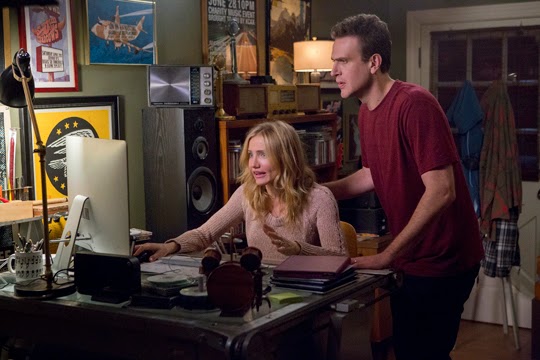Three stars. Rated R, for profanity
By Derrick Bang
A little of Zach Braff goes a
long way.
He directed and co-wrote this
film, sharing scripting credit with older brother Adam. The brothers also can
be found among the 15 producers, co-producers, line producers and executive
producers — just in passing, can we finally admit that the jockeying for
“producer” credit has well and truly gotten out of hand? — and Zach also stars.
Perhaps more tellingly, crucial
funding was provided by the 46,520 backers who contributed to a Kickstarter
campaign, so that Braff had the creative freedom to cast, shoot and cut the
film precisely to his specifications. He likely found it reasonable to assume
that the lion’s share of these crowd-funding supporters were fans who’ve
followed his career since TV’s Scrubs:
No surprise, then, that Braff has rewarded this loyalty by playing a character
whose mannerisms and line readings look and sound much like that show’s Dr.
John “J.D.” Dorian.
Which isn’t a bad thing, as long
as one enjoys the by-now-very-familiar
Braff shtick.
Braff has been dubbed the New
Jersey Woody Allen, and with ample cause; the younger actor/filmmaker delivers
a similar blend of chatty social ineptness and Jewish angst. Much of Braff’s
dialogue has the cadence and timing that one would expect from a stand-up act:
less a dramatic performance, more like stepping out of the character in order
to make a wry observation about life, the universe and everything.
But not consistently, in the case
of this film. At times, we get the Zach Braff from Scrubs, delivering a line with the wheedling, precious, little-boy
inflections of an adolescent trying to talk his parents into serving ice cream
for supper. Alternatively, Braff retreats from that artifice and attempts to be
stern and serious, now wanting to persuade us that he really is capable of handling this script’s solemn
topics with an appropriate level of thespic skill.
Doesn’t work. Braff’s signature
tics and hiccups are so thoroughly a part of his performance, that he never
succeeds in becoming anybody other than himself. Which is a shame, because when
he gets out of his own way, Wish I Was Here makes some thoughtful
observations about family estrangement, seizing the day, and death with
dignity.
Braff stars as Aidan Bloom, a
35-year-old struggling Los Angeles actor who relies on wife Sarah (Kate Hudson)
to keep things together financially. He’s blithely unaware that she chafes
under the soul-sucking sameness of her public service job, believing instead that
she’s cheerfully content to keep supporting “his dream.”
They have two children — teenage
Grace (Joey King) and grade-school Tucker (Pierce Gagnon) — who attend a
private Jewish day school courtesy of tuition payments made by Aidan’s father,
Gabe (Mandy Patinkin). Aidan’s long-estranged bachelor brother, Noah (Josh
Gad), lives a withdrawn life in a house trailer by the beach, and is regarded
as a total loser by their father.









